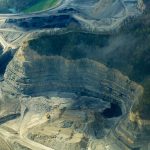All Posts
Meet Tarence, the newest member of our team!

Appalachian Voices would like to welcome Tarence, Ray, our newest member to the team! Serving as our new Central Appalachian Field Coordinator, Tarence will be working in central Appalachia helping expand our Appalachian Water Watch project and working on federal policy to end mountaintop removal coal mining.
POWER+ Plan deserves a warmer welcome

While we here in Appalachia are working overtime to reinvent our economy and outlast the fall of King Coal, you would think that our representatives in Washington, D.C., would be eager to pass measures that send much-needed federal aid to help our hard hit coal-producing counties. But most of the region’s congressmen and senators are staying silent, and those who are going on the record are definitely not stepping up to the plate.
“MVP” is not a most valued project
 Opposition is mounting to the proposed Mountain Valley Pipeline that would carry highly pressurized natural gas for 300 miles through farms and forests from W.Va. to Va. Several counties have taken action to oppose or question the project, and citizens all along the route are making their voices heard. Guest blogger Tina Badger is one.
Opposition is mounting to the proposed Mountain Valley Pipeline that would carry highly pressurized natural gas for 300 miles through farms and forests from W.Va. to Va. Several counties have taken action to oppose or question the project, and citizens all along the route are making their voices heard. Guest blogger Tina Badger is one.
Elk Make Slow Return to Appalachia
When European colonists arrived in the 1400s, Eastern elk were the most widespread hooved animal on the continent, but the subspecies was declared extinct by 1880. Today, however, another type of elk are slowly returning to Appalachia.
Read MoreSouth Fork Sharestead
In six years, Jonathan Towers has transformed his average American home into an energy-efficient, food-abundant powerhouse. By retrofitting the house to be energy efficient and maintaining a strong commitment to energy conservation, their utility bill has dropped 75 percent.
Read MoreMountain protectors try again in N.C.
 North Carolina Rep. Pricey Harrison introduced a bill today to phase out North Carolina’s use of mountaintop removal coal. The bill mirrors one that has been in the legislature before and that received bipartisan backing, with 75 legislators signing a letter of support. Rep. Harrison’s bill also aims to help ratepayers during the economic recovery by placing a moratorium on new coal-fired power plants in the state.
North Carolina Rep. Pricey Harrison introduced a bill today to phase out North Carolina’s use of mountaintop removal coal. The bill mirrors one that has been in the legislature before and that received bipartisan backing, with 75 legislators signing a letter of support. Rep. Harrison’s bill also aims to help ratepayers during the economic recovery by placing a moratorium on new coal-fired power plants in the state.
Regional Report Details Victories, Challenges Over Poverty
A report released in February by the Appalachian Regional Commission, Appalachia Then and Now: Examining Changes to the Appalachian Region Since 1965, examines the impact of improved infrastructure, education and job opportunities across the region. According to the report, Appalachia’s poverty rate dropped from 31 percent to 16.6 percent over the last five decades.
Read MoreA first for North Carolina, now open for fracking
 March 17 marked the first day in history that North Carolina has been fully open to the oil and gas industry for the dangerous, environmentally destructive practice of hydraulic fracturing for natural gas. Though the moratorium on fracking has been lifted, communities and environmental organizations across the state are prepared to continue fighting.
March 17 marked the first day in history that North Carolina has been fully open to the oil and gas industry for the dangerous, environmentally destructive practice of hydraulic fracturing for natural gas. Though the moratorium on fracking has been lifted, communities and environmental organizations across the state are prepared to continue fighting.
Although industry gets fined, citizens still pay the price

In one of the largest Clean Water Act deals in recent memory, Duke Energy agreed to pay $102 million to settle federal charges for its coal ash pollution in North Carolina. It’s the most recent example of a coal-related company facing fines for violating the law, and although that’s a step in the right direction, it can never compensate for the human cost borne for years by citizens living near coal ash ponds and mountaintop removal mines.
Yes, Virginia, there was a silver lining to the General Assembly
 For Appalachian Voices and our partners, it was a mostly defensive game this year in the Virginia legislature as we fought a slew of bad bills by industry-backed and climate-denying politicians. We succeeded in squelching the worst of them, but a lot of policy that could have moved the commonwealth toward cleaner energy and a stronger economy fell by the wayside. There’s always next year….
For Appalachian Voices and our partners, it was a mostly defensive game this year in the Virginia legislature as we fought a slew of bad bills by industry-backed and climate-denying politicians. We succeeded in squelching the worst of them, but a lot of policy that could have moved the commonwealth toward cleaner energy and a stronger economy fell by the wayside. There’s always next year….


